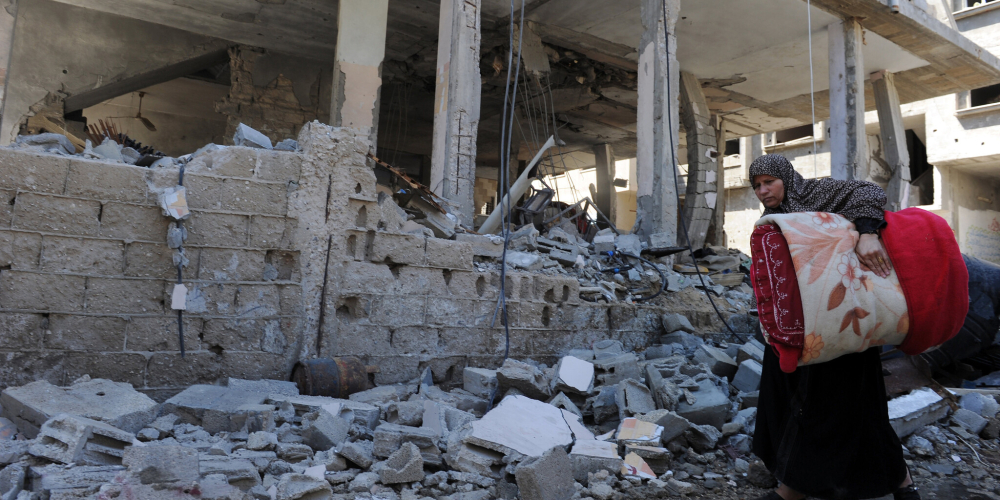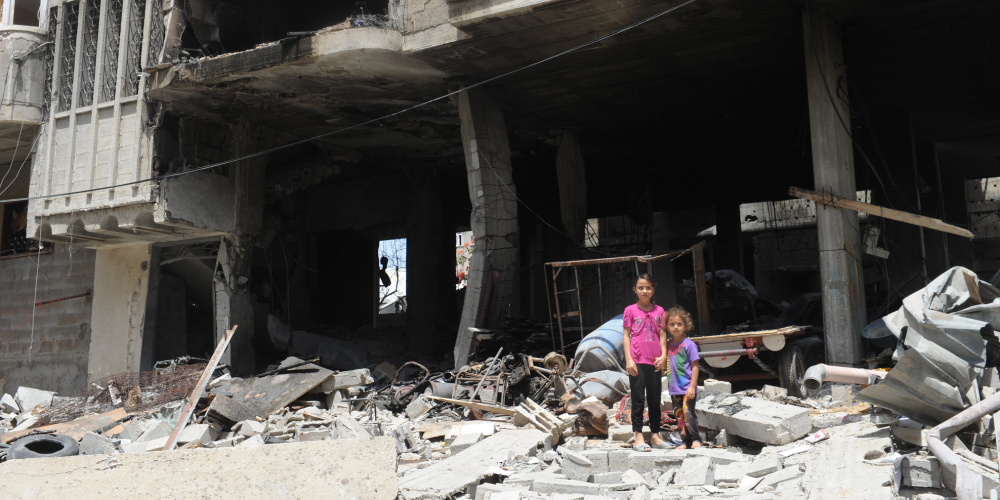By Layla Saleh
Introduction
The war in Gaza has drawn extensive attention to human rights violations, student activism, and warring propaganda narratives. No amount of counting can adequately attest to the over 20,000 Palestinians killed by Israelis and the damage to homes, livelihoods, and personhoods. This blog post, however, considers the current war in Gaza from the perspective of Feminist Foreign Policy (FFP). A relatively new turn in state security and development policies, FFP foregrounds human security in its emphasis on “rights, representation, and resources” for gender equality. I briefly assess the extent to which the declared FFP commitments of relevant states have fared during this war. A critical exploration allows us to examine the disconnect between official discourses and policies and the actual needs and experiences of local (Palestinian) women. At the same time, women’s collectives below and across the level of states denounce militarism and stress the power and distributional asymmetries that come to the fore in wartime, disproportionately impacting women and children. Over three months into the genocidal war, important questions persist about how to ‘activate’ normative paradigms in international politics. The limits of activism seem hard to breach in the corridors of state and international power. Yet directing our gaze ‘below’ reveals possibilities in theory and practice—for gender equality and the broader fight for human freedom and dignity.
Photo credit: United Nations Photo
Feminist Foreign Policy
Countries vary in their adoption and implementation of FPP first announced in Sweden in 2014. Canada, France, Mexico, Spain, Luxembourg, Germany, Libya, Argentina, and Chile have also joined the ranks in those states who pledge to pursue gender equality internally and externally in their development and foreign policies. Attempting to put forth a “gold standard” for states wading into the new waters of feminist foreign policy, the International Center for Research on Women (ICRW) has defined it as “prioritiz'[ing] peace, gender equality and environmental integrity; enshrines, promotes, and protects the human rights of all; seeks to disrupt colonial, racist, patriarchal and male-dominated power structures; and allocates significant resources, including research, to achieve that vision” in policy crafted in collaboration with activists and social movements. This expansive and ambitious definition is gratifying for curious feminists eager to observe the tempering (if not overhaul) of state policies with normative visions. After all, the staying power of feminist praxis around the world stems from precisely that. Translating theories about patriarchy into practice is a key aim of feminism(s), including ‘Third World,’ anti/postcolonial, or intersectional variants relevant here.
This is not to say that there is or should be a uniform or single feminist position on Gaza or any conflict. As Marysia Zalewski noted years ago, feminism is not a “template” but more a “numerous sets of practices, theories, philosophies, and perspectives” centering gender in analyses of social and political issues—including international politics. Some basic principles can thus form a benchmark to guide assessments of the “feminist” in foreign policy. Especially for those not familiar with explications, such as that by the Palestine Feminist Collective, of how and why Palestine is a feminist issue. The ICRW definition of FFP is useful in establishing normative principles amenable to practical implementation by states. The “peace, gender, equality,” “human rights,” and “colonial, racist, patriarchal and male-dominated structures” easily manifest as focal points for evaluating purported feminist foreign policy.
Evaluating FFP
We can thus conduct an initial, brief empirical test. How have the states with declared FFP reacted to the conflict and its major issues of apparent contention? These include unqualified Israeli “right to self-defense,” a disregard for Palestinians and their casualties as either regrettable deaths or simply “human shields” put in harm’s way by Hamas, and an absolute refusal of a ceasefire for over a month of Israel’s scorched earth pounding of Gaza playing out live before all of us glued to our mobile, tablet, and TV screens. As the Gender Security Project pointed out, Germany and Canada have been most vociferous in their support of Israel, France pushed the two-state solution while taking some measures against pro-Palestinian protests, and Scotland called for a ceasefire early on. Spain has vocally backed the Palestinians, with Argentina, Chile, and Colombia decrying Israeli aggression. Colombia and Chile would later recall their respective Israeli ambassadors. Libya’s State Council announced plans to cut ties with backers of Israel.
In this mixed picture, we see a disconnect between (varying degrees of) declared commitments to the rights representation and resources of FFP, in a conflict where over half of reported deaths have been women and children. The staunchest pro-Israel stances, however, come from Western countries. Yet preventing violence against women and children, among other harms, is presumably a priority for feminist foreign security and development agenda that emerged in Europe. This has been more than an abstract goal. At the Shaping Feminist Foreign Policy Conference last September, Germany’s Minister of Foreign Affairs Annalena Baerbock catalogued how “Russia’s horrific war” was “above all affecting women, the elderly and children.” She then explained how such impacts of the war were among the “rights” component of Germany’s FFP: “That we guarantee the right to protection and where we cannot guarantee protection we need to call those who infringe upon and violate rights to account.” Fast forward to the war in Palestine. Baerbock’s (and other Western officials’) repeated visits to Tel Aviv, amidst Israeli massacres and the flattening of Gaza signalled support, not accountability, for war crimes.
A Critical Lens
Is the problem, then, not enough feminist foreign policy? Perhaps not. The UN’s Women, Peace and Security Agenda, predating and feeding into Feminist Foreign Policy, is telling. Rema Hammami has shown how UN and Western donors pushing an anti -violence against women program in Palestine overlook the violence wrought by the occupying Israeli state. The depoliticized focus on domestic violence sidesteps the overarching conflict that frames the lives of women, children, and all Palestinians. In the same volume, Nadera Shalhoub-Kevorkian illustrates how Israeli violence or “state criminality” against “unchilded” schoolgirls in the Occupied Palestinian Territories hides behind an unwillingness by international stakeholders to recognize the Zionist state’s deliberate (sexualized) physical and psychological harm as such.
Critical work about international gender-based violence discourses is therefore a useful starting point for interrogating feminist foreign policy. As Lila Abu-Lughod and her co-editors Hammami and Shalhoub-Kevorikian, powerfully argue in The Cunning of Gender Violence, the international concern with gender-based violence against women (GBVAW) in Muslim locales (including Palestine) comprises an imperial and racist governance regime “antithetical” to feminist principles. Its interventions fail to substantively improve women’s lives. Instead of the attentiveness, trust, and relationality that feminist notions of care propound, GBVAW proffers “deeply flawed forms of care” embraced only out of desperation, they suggest. The contexts of occupation, war, and underdevelopment in (formerly) colonized countries render the preoccupation with narrowly defined violence against women superficial at best. Such policies ignore the actual needs of women in these settings. They are imposed top-down without much room for meaningful inputs from society. Worse, Abu Lughod et al. pinpoint how this fad reinforces Orientalist stereotyping about Muslim women while bolstering War on Terror discourses and practices.
Hence, GBVAW represents a situation where feminist activism pushed forth an agenda in earnest only to see it flounder in the bureaucratic intricacies of the UN and the hierarchical power relations between the West and the Global South. Much-vaunted WPS resolutions and programming stop short of localized feminist concerns. Remarkably, some of the most authoritarian Arab states have adopted tenets of WPS, seemingly scoring “liberalizing” points beneficial to their nation branding. Rumblings about whether the UAE will adopt a feminist foreign policy, for instance, raise questions about how equality of representation and resources can take place without a modicum of popular sovereignty or democratic institutions and procedures. Other Gulf states have moved to incorporate women into security and peacebuilding roles. The point is that the latest “modernizers” of the Middle East have eagerly jumped on the feminist bandwagon in a manner that seems to deflate feminist principles. The new “state feminism” may be an internationalized feminism. Bargains are struck not between publics and authoritarians, but between Western states, global governance institutions, and Arab authoritarians (Some, like the UAE, have normalized with Israel.) This can earn Gulf states a seat at the table, international accolades, and a freer hand in regional politicking in parallel with “deals of the century.” But where are the (non-elite) women, actually?
It may be too early to tell how Feminist Foreign Policy will unfold in the long term. Some statements and positions on the Gaza war suggest a logic similar to the “gender-based violence” regime. For a few Western states, perhaps Feminist Foreign Policy effectively minimizes or ignores Israeli apartheid and war crimes while claiming to (selectively) fight on behalf of the world’s downtrodden women, from Afghanistan to Ukraine. This is especially striking since, as Rabab Abdulhadi notes, gendered and sexualized violence against Palestinians is now a “constant feature of Israeli settler colonialism rather than an aberration from its mythical image.” The colonialism of the Zionist state and the international apparatus upholding it are not disturbed by feminist foreign policies as such. Even before October 7, Gaza had suffered a suffocating blockade for sixteen years, despite the feminist foreign policies of key EU states. Three weeks into this war, Germany and Canada, for instance, abstained from a UNGA vote for a humanitarian truce despite the carnage on full display.
Photo credit: United Nations Photo
Back to Civil Society
Shifting our attention to local, diasporic, and transnational civil society and academic activism, thus highlights some of the shortcomings of FFP. Consideration of more radical demands and concerns can bring us closer to the liberatory potential of feminism for the women (and men) of Palestine. This is not to say that a consensus exists on Palestine among feminists outside the region, e.g. in the US—Israel’s top ally. However, this latest war does appear to have sparked some momentum in English-speaking circles where Palestine is understood as a feminist and anticolonial cause. Walkouts in universities, petitions by scholars opposing Israeli apartheid, occupation, and genocidal war crimes including against women and children are a rejoinder to official statements of states such as Germany—or of course the US. They span calls for a ceasefire and arms embargo by groups such as WILPF who oppose militarization and promote nonviolence, and by FRIDA, the Young Feminist Fund, which does not shy from enunciating the right to “resistance” by “oppressed peoples. In addition to the millions protesting the war in the Middle East and around the globe, these voices stand out against the jaw-dropping inaction of Arab states. They challenge the feebleness of “feminist” foreign policies in Europe that, combined, have failed to halt the war and stanch the bloodbath.
Transnational feminists, international organizations and even states would do well to recall the long history of Palestinian women’s struggles inextricable from the nationalist movement against Israeli settler-colonialism. This activism refuses current Israeli narratives justifying their aggression on feminist (or “pinkwashing”) grounds. Storylines of saving women from patriarchal militants through a putatively superior feminist consciousness ring hollow, coming from a patriarchal state. Israel’s wars and occupation target Palestinians in gendered ways: as mothers, in prisons, as caretakers and breadwinners. As Islah Jad has noted, Palestinian women’s activism spans the ideological spectrum. “Competition” between groups has facilitated advocacy for more egalitarian legal and societal measures, she suggests.
These accounts seem to get lost in debates about the scope of “feminist” foreign policies. Whose feminism, which women’s struggles, and what particular obstacles to human security and development stand in the way of gender equality in a place like Palestine? That unabashedly siding with Israel can still be feminist foreign policy dilutes the normative edge of what some call values-based foreign policy. Liberal declarations measured in funding allocations cannot enhance the lives of women, children, or men. Not unless some foreign policy fundamentals (alliances, arms transfers, diplomatic cover, and dehumanization of Palestinians) are called into question.
Researching Women in War
Finding the feminist in foreign policies, effective or not, necessitates keeping an eye below. Exclusive emphases on official discourses come up short. Not all that glitters is feminist. For those of us (postcolonial, diasporic) who work on anti-authoritarian resistance and engage in critical interrogations of Western foreign policy in the Middle East, that has been one clear implication of the Gaza war. We have long been cognizant of “state feminism” and its pitfalls. Perhaps now a similar skepticism can inform our readings of “feminist foreign policy” that does little to advance the rights, representation, or resources of (many) women in the Global South. This war, its precise outcomes not yet determined, reminds us that feminism winding its way through the maze of global governance is built on unsteady ground. Yet the emptiness of “feminist” in foreign policy does not necessitate disregarding the label altogether. Instead, its deficiencies can become a site for further feminist scholarship, an impetus for solidarity.
Western governments have long skipped over “the people” in Arab settings, as aspiring democratizers or even as women they themselves speak of “empowering”. Meaningful and substantive feminist, anticolonial, and democratic struggles can be visible from the bottom up, in and outside the borders of Palestine, for those who care to take them seriously, in feminist parlance. We are of course beyond platitudes that women or even children possess and wield political agency. Statements by women and child prisoners released in the November 2023 hostage exchange were one such confirmation.
Finally, for scholars and activists observing the conflict live but often second-hand, heartbreak is an almost automatic response. Tiny bodies wrapped in white shrouds, bereaved siblings comforting one another, and accounts of amputations conducted without anaesthetics on children, elicit grief and rage that should not be tucked away. Feminist scholars have mused about how (scrutinized) emotions permeate and enrich research and activism. For Sara Ahmed, feminism itself is a “response to pain and…a form of anger directed against that pain” inhering in (collective) injustice. Sarah Ilhmoud writes that “bear[ing] witness” to Israeli genocide is a kind of love, a “radical decolonial politic of fighting for life.” Practices of care in research, reporting, and advocacy can guide us towards local (feminist) conceptions and practices. Drawing on her own and her interviewees’ accounts, Malaka Shwaikh highlights not Western-imposed resilience, but sumud or “steadfastness” as Palestinian resistance against Israel. Thus far, Feminist Foreign Policy does not seem to have upset the cart in favour of gender equality rooted in social and economic justice, popular sovereignty, national self-determination, and basic human dignity. How can we proceed in understanding both Western foreign policies and the complex sociopolitical dynamics of colonized peoples resisting occupation? Studying occupation and war as experience to examine women’s struggles is one way. Through such knowledge practice we can begin to gauge what it would take to move closer to freedom—with or without feminist foreign policies.
 Layla Saleh is Director of Research at Demos-Tunisia, Democratic Sustainability Forum and Associate Editor of the Brill journal Protest. Her latest book (co-authored with Larbi Sadiki), Revolution and Democracy in Tunisia: A Century of Protestscapes, is in press with Oxford University Press.
Layla Saleh is Director of Research at Demos-Tunisia, Democratic Sustainability Forum and Associate Editor of the Brill journal Protest. Her latest book (co-authored with Larbi Sadiki), Revolution and Democracy in Tunisia: A Century of Protestscapes, is in press with Oxford University Press.



